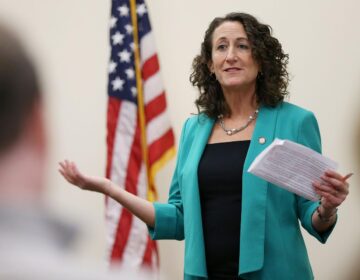Ballot questions should be clear, but two written by the Wolf administration don’t pass the test
Two proposals that will be before voters this May have drawn the ire of Republican leaders in the state House and Senate.

A person enters the voting booth to cast their ballot. (Jessica Griffin)
This story originally appeared on Spotlight PA.
___
Spotlight PA is an independent, nonpartisan newsroom powered by The Philadelphia Inquirer in partnership with PennLive/The Patriot-News, TribLIVE/Pittsburgh Tribune-Review, and WITF Public Media. A version of this story originally appeared in our free weekly newsletter.
Amending the Pennsylvania Constitution is a lengthy process that ends at the ballot box, where voters are asked to make consequential decisions based on a few lines of text.
For both supporters and opponents of these measures, that means each word included — and excluded — from the question on the ballot is critical.
Two proposed constitutional amendments that will be before voters this May have drawn the ire of Republican leaders in the state House and Senate, who called language written by the Wolf administration “prejudicial.”
The proposals would give the General Assembly the power to end a disaster declaration without the governor’s approval and would require the executive to seek lawmakers’ consent to continue a declaration past 21 days.
The Department of State, the head of which is appointed by the governor, summarized the proposals into ballot questions, which will tell voters that the amendments “increase the power of the General Assembly” and “[remove] the existing check and balance.”
“They clearly wrote it in a way for it to fail,” Senate President Pro Tempore Jake Corman (R., Centre) told reporters in February.
GOP lawmakers aren’t the only ones who think the language is problematic.
Berwood Yost, director of the Center for Opinion Research at Franklin & Marshall College, recently wrote that these questions need to give voters the “information they need to make an informed decision.” And on that account, he wrote, the Department of State failed.
The center conducted an experiment in 2016 involving another controversially worded ballot question that showed just how much language matters.
In that case, the GOP-controlled legislature rejected language written by the Department of State that stated the retirement age for judges would be raised from 70 to 75. Republicans rewrote the language so voters were only asked if they supported a retirement age of 75.
People surveyed by F&M at the time were randomly given three versions of the question: one written by the Wolf administration, one written by Republicans, and another written by pollsters. When shown the pollster and Wolf language, the measure failed. When shown the Republican language, it passed — which is what ultimately happened.
“The most basic rules of question construction are commonsensical: form a question that is easy to understand, uses everyday language, uses words with clear and specific meanings, and is as short as possible,” Yost wrote earlier this month. The Department of State failed to follow those rules as its questions use “loaded terminology” and lack context, he continued.
A spokesperson for Gov. Tom Wolf defended the questions’ wording.
“A long series of court cases have emphasized that it is necessary for voters to have sufficient context related to the question being presented to them for a vote and the administration believes that the ballot questions provide that context while fairly, accurately, and clearly apprising voters of the issue to be voted on,” spokesperson Lyndsay Kensinger wrote in an email.
So what happens next? Republicans said they won’t bring legal action — like two former state Supreme Court chief justices did in 2016 — and will focus instead on educating voters about what the amendment would do. (A more in-depth “plain English statement” written by the Office of Attorney General will be posted at polling places.)
Meanwhile, Corman has floated the idea of drafting legislation that would transfer the power to write questions from the Department of State to the Legislative Reference Bureau of Pennsylvania, which prepares bills for lawmakers.
“But that’s down the road,” he said last month. “We’re going to the voters, and we think that’s the best way to move forward.”
 WHILE YOU’RE HERE… If you learned something from this story, pay it forward and become a member of Spotlight PA so someone else can in the future at spotlightpa.org/donate. Spotlight PA is funded by foundations and readers like you who are committed to accountability journalism that gets results.
WHILE YOU’RE HERE… If you learned something from this story, pay it forward and become a member of Spotlight PA so someone else can in the future at spotlightpa.org/donate. Spotlight PA is funded by foundations and readers like you who are committed to accountability journalism that gets results.
WHYY is your source for fact-based, in-depth journalism and information. As a nonprofit organization, we rely on financial support from readers like you. Please give today.







